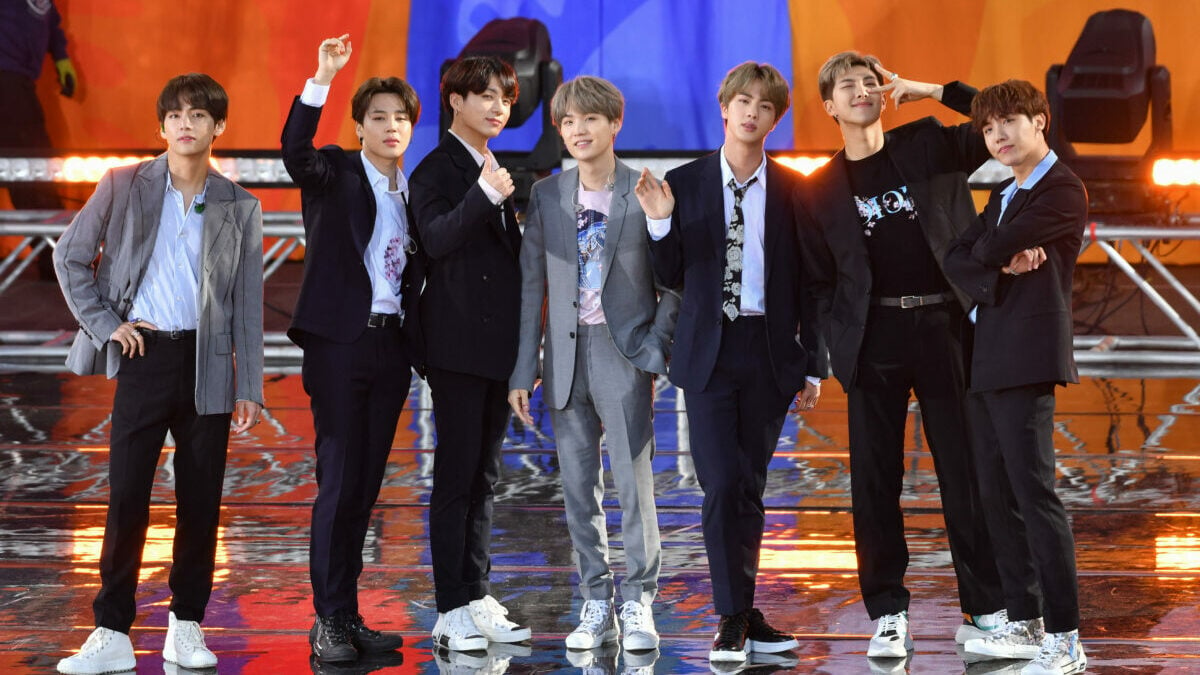Usually in the music industry, the biggest and most dramatic headlines are about the artists. Labels, music publishers and managers only rarely get attention outside industry publications like MBW or Billboard.
As important as someone like Sir Lucian Grainge may be to the industry, he’ll never get the kind of media attention that Taylor Swift gets.
Which is, of course, as it should be. When a corporation or its top execs are making more press than its public-facing business, something has gone wrong. (Elon Musk, take note.)
Which is why the headlines around South Korean music giant HYBE of late have been so disconcerting. If you’ve scanned the news over the past year, there’s a good chance you’ve come across a dramatic (and often hyperbolic) conflict between HYBE-owned label ADOR and its superstar group NewJeans; back-and-forth accusations between ADOR and its now-former CEO, Min Hee-jin; the sudden departure of one of HYBE’s most prominent execs, Scooter Braun; and accusations of insider trading and tax malfeasance, including against the company’s storied founder, Bang Si-hyuk.
Taken together, one could be excused for thinking HYBE is in serious trouble. Yet there’s also been a whole slew of other news coming out of HYBE – which paints a completely different picture.
Even as HYBE scrambles to put out legal and public relations fires on multiple fronts, its transformation from South Korean K-pop company to global music giant is accelerating. The company is reporting record revenues. K-pop itself is hitting a fever pitch this summer, with the massive success of Netflix’s Kpop Demon Hunters, while HYBE’s KATSEYE girl group are seeing massive ticket sales for their first world tour.
And lest we forget: BTS – the K-pop superstars whose success put HYBE on the map – are back from a prolonged hiatus.
So one can hardly conclude this is a company on the verge of implosion, but it might be fair to say that HYBE is showing signs that it’s suffering from the “Toyota curse”: When a business grows very quickly, it risks losing its grasp on corporate culture and quality control.
Here are the five most important things to know about HYBE today.
1) Allegations (and convictions) over stock trading and tax malfeasance are swirling around the company
Bang Si-hyuk, the man credited with making HYBE what it is today, could be in some serious legal trouble. In mid-July, South Korea’s Securities and Futures Commission (SFC) forwarded a complaint to prosecutors in an investigation over alleged “unfair trading” related to HYBE’s 2020 IPO.
This means the founder, Chairman and former CEO of HYBE, along with three others at the company, is under investigation for what could be a serious violation of South Korea’s Capital Markets Act. At the heart of the SFC’s complaint is a suspicion that Bang enriched himself ahead of the IPO by misleading certain pre-IPO investors into believing the public stock listing would be delayed (it wasn’t).
These investors reportedly reacted by selling their stakes in HYBE to a special purpose company controlled by HYBE executives. When HYBE’s stock soared on its stock market debut, the special purpose company dumped its shares and Bang allegedly pocketed 30% of the profits himself, reportedly amounting to 190 billion Korean won (USD $137 million).
Days after the SFC forwarded its complaint to prosecutors, police raided HYBE’s Seoul headquarters in connection with the investigation. HYBE had no comment on the matter, but prior to the raid, as rumors about the regulator’s investigation circulated through the media, HYBE told MBW it’s “fully cooperating with the local authorities, including the financial regulators and the police, by submitting relevant materials and providing detailed explanations as part of the fact-finding efforts… We will take the necessary time to thoroughly demonstrate that the IPO was carried out in full compliance with laws and regulations.”
The latest chapter in this drama unfolded at the end of July, when South Korean tax authorities visited HYBE’s headquarters in connection with the alleged IPO scheme. Regulators want to know whether the alleged transactions broke any tax laws.
And that isn’t the only allegation of “unfair trading” involving HYBE insiders. According to news reports out of South Korea in late July, three individuals who had once been employed at HYBE subsidiaries were convicted of insider trading, having sold shares of HYBE ahead of the company’s announcement three years ago that BTS – far and away HYBE’s most successful act – would be going on hiatus due to mandatory military service.
That news caused shares of HYBE to drop nearly 25% in one dizzying trading day in June 2022.
Making matters worse was confusion over the story created by… HYBE’s own PR people. Shortly after MBW reported on the convictions, citing reports in South Korean media, we were contacted by Tag PR, a HYBE-owned L.A.-based public relations agency, which requested a correction: The three individuals, Tag PR said, had not been employees of HYBE. Less than a day later, MBW was contacted by Rachel Um, HYBE’s Seoul-based global head of communications, who issued a correction to the correction.
“It’s confirmed that the three individuals addressed were all former HYBE employees as they were charged with insider trading,” Um wrote. “They had all left HYBE by then. While they did work at HYBE, they had no personal connections with Chairman Bang.”
That last detail denying any personal connections to Chairman Bang was interesting in and of itself, given that MBW hadn’t reported on any such connection. In this instance, a PR headache was turned into a migraine by errors within the communications team. Not the HYBE communications team’s best day, to say the least.
2) HYBE is winning its dramatic battle with NewJeans and Min Hee-jin, but has gotten a black eye in the process
If there’s one issue that’s been a bigger PR headache for HYBE than the stories about stock malfeasance, it’s the ongoing and bitter feud between HYBE subsidiary ADOR and its former CEO Min Hee-jin, a conflict that became a PR supernova when ADOR’s superstar group NewJeans joined the fray.
The conflict entered the public eye some 15 months ago, when HYBE let it be known it was launching an audit of senior ADOR execs, including Min, over what it claimed was was an attempt to seize control of ADOR from HYBE and tampering with company operations. At a teary press conference, Min denied the allegations, arguing she couldn’t have taken control of the company given that she only had an 18% stake.
Nonetheless, HYBE went on to file criminal complaints against Min, and in August 2024 ADOR removed her as CEO.
Within a few weeks, ADOR’s biggest act, NewJeans, stepped into the fray. Long rumoured to have sided with Min – the group’s creator and producer – NewJeans member released a YouTube video (which was eventually pulled down) alleging mistreatment and harassment at the hands of ADOR staff in the wake of the conflict with Min. The following month, NewJeans member Hanni testified at Korea’s National Assembly, alleging workplace harassment at ADOR.
In late November – about a week after Min resigned as an internal director at ADOR, thus severing her last professional link to the company – NewJeans announced in a press conference that they are unilaterally cancelling their contract with ADOR and striking out on their own. In the weeks ahead, they would launch plans for independent appearances and change their name to NJZ. But HYBE was having none of it; the company filed a lawsuit seeking a court ruling that the contract remained valid, and in January 2025, HYBE again went to court seeking an injunction to prevent NewJeans from independent commercial activities while the lawsuit was being litigated.
In March, a South Korean court granted HYBE the injunction. NewJeans appealed that ruling, and lost again on appeal. When they failed to file another appeal this past June, it was clear the group had given up on preventing the injunction.
Nonetheless, the main court battle – over whether or not NewJeans’ contract with ADOR is valid – continues, and in a hearing on July 24, the group said through its lawyers: “Telling us to return to ADOR and HYBE is like telling the victim of school bullying to return to the same school and endure it.”
So far, HYBE is winning the business and legal battle – they’ve removed Min from ADOR, won the support of South Korea’s music industry in the legal battle with NewJeans, and won the early courtroom skirmishes in that battle.
But when the news is filled with headlines comparing HYBE to a schoolyard bully, the company’s higher-ups must certainly wonder whether it wouldn’t have been better to have resolved the issue with Min behind closed doors.
3) HYBE’s revenue is soaring
With all the controversies surrounding HYBE at the moment, you’d think the company would be taking a financial hit – but you’d be wrong. Despite a dip in operating profit driven by the absence of BTS, recently HYBE’s finances have seen a significant improvement, boosted by growing popularity of live K-pop shows, international expansion, and the success of its Weverse superfan platform.
HYBE’s Q1 2025 revenue jumped an impressive 38.7% YoY, to KRW 500.6 billion (approx. USD $348.4 million) driven forward by a tripling of concert revenue. Tours from j-hope of BTS, SEVENTEEN, TOMORROW X TOGETHER, ENHYPEN, and BOYNEXTDOOR sent the company’s revenue into the stratosphere even amid a 5.9% YoY decline in recorded music sales.
The company’s “artist-indirect involvement segment,” which includes the Weverse platform, saw revenues jump 23.7% YoY to KRW 178.1 billion ($124 million). Weverse clocked 10 million monthly active users (MAUs) in Q1, up from 9.4 million a quarter earlier and up from 9.2 million a year earlier.
And the platform isn’t just a hit in South Korea: Weverse President Joon Choi told MBW earlier this year that “90% of our traffic comes from regions outside of Korea, which means that most of our users are global superfans.” On top of numerous K-pop acts from HYBE and other agencies, the platform has attracted the likes of Ariana Grande, Dua Lipa, and Megan Thee Stallion.
For a company that spooked the markets three years ago with the announcement of BTS’ hiatus, these are impressive results – and they show that HYBE has grown far beyond its reliance on a single superstar K-pop band.
(That’s backed up by HYBE’s own data: HYBE CEO Jason Jaesang Lee told analysts on a recent earnings call that BTS’ share of HYBE’s revenue has fallen below 20%, down from more than 95% five years earlier.)

4) HYBE’s global strategy is taking flight…
Weverse’s success in attracting global superstars is just one aspect of HYBE’s “globalization.” In recent years, it has launched numerous divisions outside Asia, largely through an acquisition strategy. HYBE America was born out of the $1.05-billion acquisition of Scooter Braun’s Ithaca Holdings in 2021, in which Braun became CEO of the new company, while HYBE Latin America was born out of the 2023 acquisition of Exile Music. The company is now eyeing the launch of HYBE India sometime later this year.
But for HYBE, going global isn’t just about owning music businesses around the world; the company is aiming to globalize the K-pop methodology, the system for creating pop groups – innovated in large part by Bang Si-hyuk – which involves extensive talent searches, an elimination process that’s often broadcast as reality TV, an intensive training regime, and the careful development of a public image.
To that end, HYBE teamed up with Universal Music Group’s Geffen Records to recruit and launch its first global girl group. A pool of 120,000 would-be candidates was eventually narrowed down to six members of the group now known as KATSEYE. Launched last year, the group is building the kind of loyal following that K-pop groups are known for. Tickets for KATSEYE’s first world tour went on sale in July and sold so quickly that additional shows were rapidly added in New York, L.A. and San Francisco.
HYBE now aims to replicate that success with its first global boy group – it recently teamed up with Ryan Tedder to get the ball rolling – and is moving forward with plans to apply the K-pop methodology to Latin music as well. HYBE recently announced the finalists for SANTOS BRAVOS, its first-ever Latin boy group, and one of three the company is planning to launch in the near future.
HYBE’s global expansion has also meant a considerable restructuring at the company. Last year, it announced the launch of ‘HYBE 2.0,’ which saw CEO Jiwon Park succeeded by Jason Jaesang Lee, the creation of a new division – HYBE Music Group APAC – to oversee its Korean and Japanese activities, and the reorganization of its existing businesses into three pillars: Music, Platform, and tech-driven future growth initiatives.
One unexpected change to the leadership team came at the beginning of July, when Scooter Braun announced his departure as CEO of HYBE America. Some media outlets speculated that Braun was unhappy at HYBE America, but the evidence for that, at least so far, is razor thin.
Succeeding Braun is Isaac Lee, who has been serving as Chairman of HYBE Latin America.
Lee’s new title – CEO of HYBE Americas (that’s plural Americas – not just America) – suggests a deeper integration of HYBE’s US and Latin American operations than had been the case before.
5) …But K-pop is still the butter on HYBE’s bread
In recent years, Chairman Bang has at times pointed to the slowing growth of K-pop’s popularity as a key reason for HYBE’s expansion to new regions and new genres. And yet, recent events suggest K-pop is far from dead.
Over the past month, Netflix’s Kpop Demon Hunters has proven itself to be the streaming hit movie of the summer, with more than half a dozen of the songs featured in the film rocketing up the Spotify charts.
And witness, also, the euphoric buzz surrounding the return of BTS, with its members having now completed their mandatory military service.
In mid-June, HYBE saw a significant stock price hike amid rumors that BTS was about to announce its return, a sure sign that investors still see K-pop as being the driving force behind the company – even if HYBE itself is working hard to move past that perception.
Yet being the “king of K-pop” might not be a bad place for HYBE to be. Even as K-pop record sales shrank in South Korea and stagnated overseas in 2024, the K-pop events market is soaring, with market research predicting it will more than double in size between 2022 ($6.23 billion) and 2032 ($13.0 billion).
HYBE’s own balance sheet reflects this shift to live events, and the success of Weverse shows the potential of superfan monetization in the years to come. That all points to a bright future for HYBE – assuming it can take control of the embarrassing controversies that have captured headlines over the past year.Music Business Worldwide








